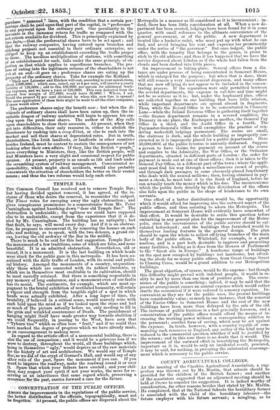TEMPLE BAR.
ME Common Council has resolved not to remove Temple Bar ; but having decided against removal, it has agreed, at the in- stance of those who desire the removal, to reconsider the subject. The 7Tmes votes for sweeping away the ugly obstruction ; and gives conspicuous prominence to a remonstrance from Mr. Peter Cunningham against knocking down "dear old Temple Bar." The
i
obstruction is undeniable ; the ugliness we could have supposed also to be undeniable, except from the experience that it is de- nied by Mr. Cunningham. The building has no antiquity ; but that fault, he says, will mend every day. And if it is an obstruc- tion, he proposes to circumvent it, by removing the houses on each side,- and making, so to speak, with the two detours, a grand cit.- ens, leaving the old archway of the Bar in the middle. ihere 'is much to be said for this last suggestion. Temple Bar is the tnenument of a few traditions, some of which are false, and none beautiful. It is an admitted obstruction. Nevertheless, old or recent, it is a monument. It is the last building on which heads were stuck for the public gaze in this metropolis. It has been as- sociated with the daily traffic of London, with its social and politi- cal history. Amongst the monuments of a country, unquestion- ably those which are connected with its noblest incidents, or which are in themselves most creditable to its cultivation, should be most sacredly retained. But there is something respectable in any memory of long endurance, and a monument even of our faults has its moral. The sentiments, for example, which are most op- pug:tiara to the brutal exhibition of mutilated humanity, will retain a vig-our and strength from the tangible sight of a spot in which heads were actually exhibited. After a long lapse of time, the brutality, if believed in a critical sense, would scarcely seize with such hold upon the mind as if we looked upon the stone and had so much of the picture actually before us, only needing to fill in the grim and wrinkled countenance of Death. The punishment of hanging might itself have made greater way towards abolition if toe could frequently, in passing to the West, have seen that "TYhurn tree" which so often bore " fruit," and if we could thus have marked the degree of progress which we have already made, as art encouragement to making more.
In regard to4he artistic effect of a monumental building, there is also the use d, comparison ; and it would be a grievous loss if we were to destroy, ,throughout the world, all those buildings which, being in themselves " ugly," would deprive us of the raw materials fbr the history of art and architecture. We would say of Temple Bar;as we did of the crypt of Gerrard's Hall, and would say of any other relic of the past, Spare the monument if you can. If you Want to improve the roadway, make the roadway round it or over it. Spare that which your fathers have erected ; and your chil- dren may respect your spirit if not your works, the more for re- ceiving as an inheritance that same regard which, preserving a reverence tbr the past, carries forward a care for the future.


























 Previous page
Previous page